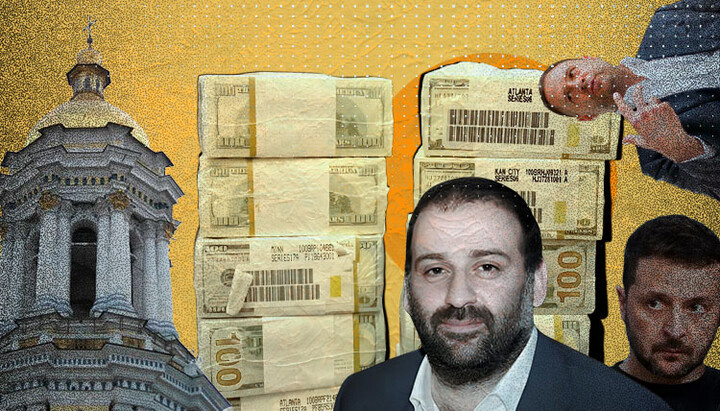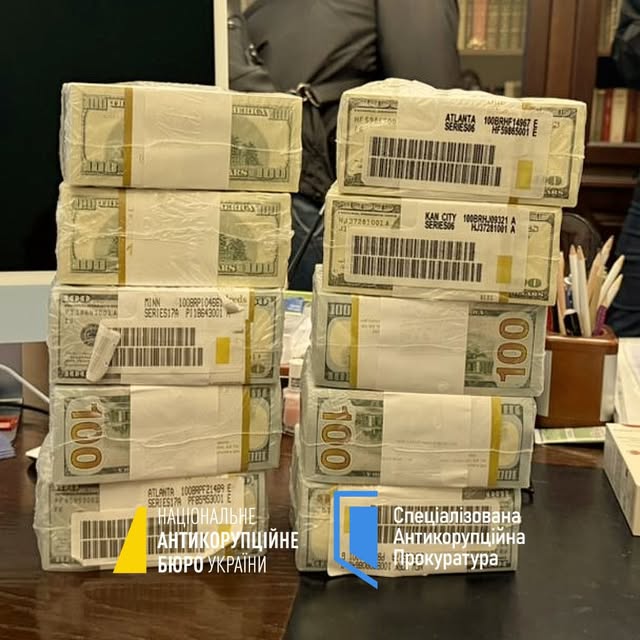Zelensky-style sanctions: "Mindich case" vs. "UOJ case"

10 years of sanctions for journalists for criticizing the authorities and 3 years for corrupt officials for stealing millions. A story about who and how is punished in modern Ukraine.
At the end of October 2025, an event occurred in Ukraine that cannot but alarm everyone who values freedom of speech and religion. President Volodymyr Zelensky signed a decree imposing sanctions against journalists and editors of the Union of Orthodox Journalists and the "First Cossack" project.
These people are neither officials, oligarchs, nor corrupt individuals. Their only "crime" is covering events surrounding the Ukrainian Orthodox Church. Previously, criminal cases had already been initiated against them on charges of treason with the threat of life imprisonment. Now, sanctions for 10 years have followed: asset seizure, a ban on any financial operations, movement within Ukraine, use of phones, and more.
And literally a few days after this, the world was shocked by the largest corruption scandal in Ukraine in recent years. The figures in this scandal included not only ministers of the country's top leadership but also Zelensky's closest friends from "Kvartal 95". These people were stealing money intended for the energy sector, and possibly Ukraine's defense capability. The NABU showed bundles of dollars found during searches, still sealed in American banks. There is no doubt that this is money the country received as aid from Western partners.

On November 13, Zelensky imposed sanctions against the corrupt individuals who, according to the investigation, stole more than 100 million dollars. Logic suggests: the theft of hundreds of millions during wartime is a real crime against the country. Unlike journalists who simply wrote the truth about the Church.
However, the sanctions against the corruptionists turned out to be purely symbolic. What is happening?
Sanctions against journalists: freedom of speech under threat
On October 31, 2025, Zelensky enacted the decision of the National Security and Defense Council (NSDC) on personal sanctions against individuals related to the activities of the Union of Orthodox Journalists (UOJ) and the resource "First Cossack".
Considering that this punishment was applied to people whose only crime was to show how the authorities violate freedom of speech and the rights of believers in Ukraine, it can be called unprecedented.
In particular, the sanctions include:
- blocking of accounts and assets;
- a ban on media distribution in Ukraine;
- termination of electronic communication services (phone and Internet);
- restriction of trade operations;
- blocking of UOJ websites and social networks.
Moreover, the Ministry of Foreign Affairs is instructed to inform the European Union and the USA about these measures so that they "take an example" and introduce similar restrictions.
In other words, journalists who defend the canonical Church have been officially equated by the Ukrainian authorities with high-level enemies of the state, and it has been declared that their activities pose a threat to national security. None of them surrendered the positions of the Armed Forces, committed fraud on "humanitarian aid", or demanded kickbacks for making decisions. All their "weapons" are a computer, camera, and phone. All the materials they published and continue to publish are in open access (to this day), and anyone can visit the UOJ website or social networks to personally see the full extent of their "crimes". Believe me, you will not find anything more seditious than reasoned criticism of the OCU there.
Who is stealing millions?
Meanwhile, a scandal is unfolding in Kyiv, already dubbed "Mindichgate" in the media.
According to the National Anti-Corruption Bureau, Zelensky's close friend and associate, Timur Mindich, co-owner of the "Kvartal 95" studio, is accused of leading a corruption scheme in the energy sector. The scheme included kickbacks of up to 15% from contracts of the largest state enterprise "Energoatom".
We are talking about hundreds of millions of dollars - money that was supposed to go to modernize energy and strengthen the country's defense capability during the war.
Along with Mindich, businessman Oleksandr Tsukerman, also close to the presidential circle, is involved in the investigation. Both, according to press reports, were warned and managed to leave Ukraine before the searches began. At the same time, ministers of justice, energy, a former deputy prime minister, and possibly other high-ranking officials may be involved in the scheme.
The Ukrainian government proposed imposing sanctions against Mindich and Tsukerman for ten years. However, by Zelensky's decree, these sanctions were approved for only three years.
It is also interesting that in the sanction document, Mindich and Tsukerman are listed as citizens of Israel, not Ukraine. In other words, Zelensky imposes sanctions against citizens of another state. And this hides a special cynicism. For several reasons:
1. Just two days ago, the head of the State Border Service stated that Mindich officially left Ukraine, "because he has three children under the age of 18". But if he is a citizen of Israel, why does he need children to leave? He could easily leave with an Israeli passport. And here - one of two things: either the border service does not know which passport Mindich used to leave, or Ukrainians are being misled.
2. If sanctions are imposed on "Israeli citizen Mindich", then which Mindich falls under the restrictions - the Ukrainian businessman or some Israeli with an identical surname?
3. Most importantly, the imposition of sanctions against Israeli citizens Mindich and Tsukerman allows Ukrainian citizens Mindich and Tsukerman (against whom sanctions were not imposed) to freely dispose of property, accounts, and assets in Ukraine.
That is, in relation to the UOJ, measures of a complete ban for 10 years were applied. But in relation to Mindich and Tsukerman, sanctions were imposed for three years, and as citizens of Ukraine, they are practically not restricted in anything.
And this despite the fact that the motive for imposing sanctions against the UOJ boils down to unproven and vague accusations of "propaganda", ties with the UOC, and possible ties with Russia (which do not exist). While the corruptionits are accused of embezzling funds from Ukraine's allies and laundering money on a particularly large scale. A separate "cherry on top" is a phrase said by one of the accused and contained in the case materials: "Two million (dollars?) went to Moscow".
That is why this situation looks extremely cynical.
How is "Kvartal 95" different from the UOC?
Despite all this, Mindich and Zelensky are connected by many years of joint work in "Kvartal 95" - a comedy project from which the career of the current President began.
When the scandal broke out, the "Kvartal" studio hastened to declare that Mindich (despite the fact that he actually owns the project), "has a legal connection with the Studio, but does not participate in its activities and does not influence the content or decision of the team".
Agree, in these words one cannot help but notice a certain irony of fate. Because similar words, about "canonical connection" (not even legal), and lack of influence, have been repeated for many years by representatives of the Ukrainian Orthodox Church in the context of relations with the ROC.
Yes, historically the UOC had canonical unity with the Russian Orthodox Church. But Moscow does not control it, does not appoint bishops, does not dictate decisions. Moreover, Moscow cannot physically "dissolve" the UOC, as Mindich can with "Kvartal".
However, when it comes to the Church, Zelensky and his entourage constantly claim the opposite. UOC believers are accused of "ties with Moscow", on the basis of which monasteries are closed, monks are expelled, and sanctions are imposed on journalists. And only when it comes to the president's personal friends does a completely different logic suddenly appear: "Yes, there is a legal connection, but we are not responsible".
It is clear that if the accusations made against the UOC were voiced against "Kvartal", then "Kvartal 95" would have to be closed, and sanctions would have to be imposed against all its participants. Just as the Parliament of Ukraine, the Cabinet of Ministers, and, most importantly, the NSDC - three representatives of which, led by Umarov, are featured on the "Mindich tapes" - should be dissolved.
And after all, it was the NSDC, whose members are now accused of stealing millions of people's money, that recently imposed sanctions against journalists associated with the UOC. Why are all these structures not being disbanded, while the Church is being demanded to be banned?
Probably just because "it's different".
Conclusions
It is clear to everyone that the sanctions against journalists defending the UOC look like a tool of political revenge. While the sanctions against the corrupt from Zelensky's entourage are a crude imitation of justice.
At the same time, the first category consists of people who write about faith and the Church and avoid politics until politics begins to interfere in Church affairs. The second category includes those who profit from the war, from the tears and suffering of the Ukrainian people.
But only the first group has been declared a threat to national security.
For anyone who sincerely believes in democratic values and human rights, the situation should be clear: in a country that proudly calls itself the “outpost of democracy”, the journalists are punished for telling the truth, while the corrupt are protected. Apparently, words are feared more than missiles. And that’s no surprise. The words of Christ are quite applicable to the Ukrainian authorities: “Woe to you, scribes and Pharisees, hypocrites! You clean the outside of the cup and dish, but inside they are full of greed and self-indulgence.” (Matthew 23:25)
Let us remind the Ukrainian authorities, who claim to be striving toward Europe: freedom of religion and freedom of the press are not mere declarations for the West – they are the foundations of civilization. Their violation cannot go without consequences. “For nothing is hidden that will not be revealed.”
The UOJ journalists have committed no crimes – they have defended the Church of millions of Ukrainians. Yet they are subjected to the harshest sanctions. Meanwhile, officials who steal during wartime and commit lawlessness remain practically untouchable.
This is the true scale of the gap between Ukraine’s declarations of democracy and its actual practice.











